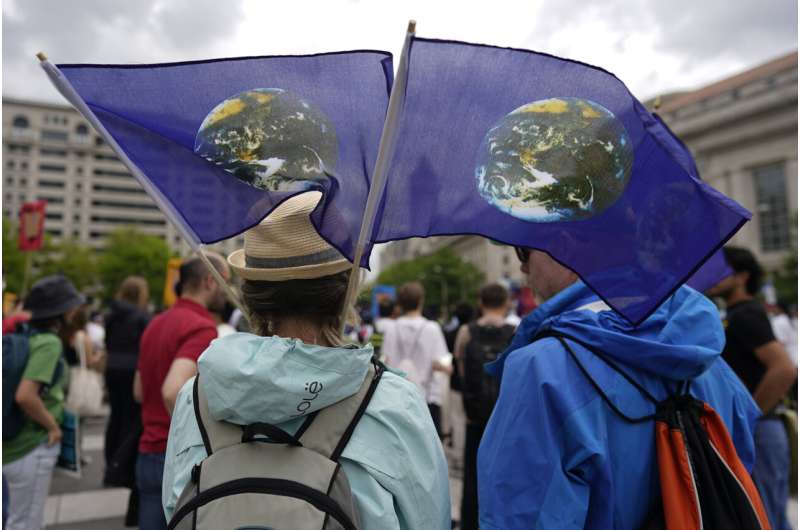This article has been reviewed according to Science X's editorial process and policies. Editors have highlighted the following attributes while ensuring the content's credibility:
fact-checked
reputable news agency
proofread
Earth Day: How a senator's idea more than 50 years ago got people fighting for their planet

Millions of people around the world will pause on Monday, at least for a moment, to mark Earth Day. It's an annual event founded by people who hoped to stir activism to clean up and preserve a planet that is now home to some 8 billion humans and assorted trillions of other organisms.
Here are answers to some common questions about Earth Day and how it came to be:
WHY DO WE CELEBRATE EARTH DAY?
Earth Day has its roots in growing concern over pollution in the 1960s, when author Rachel Carson's 1962 book "Silent Spring," about the pesticide DDT and its damaging effects on the food chain, hit bestseller lists and raised awareness about nature's delicate balance.
But it was a senator from Wisconsin, Democrat Gaylord Nelson, who had the idea that would become Earth Day. Nelson had long been concerned about the environment when a massive offshore oil spill sent millions of gallons onto the southern California coast in 1969. Nelson, after touring the spill site, had the idea of doing a national "teach-in" on the environment, similar to teach-ins being held on some college campuses at the time to oppose the war in Vietnam.
Nelson and others, including activist Denis Hayes, worked to expand the idea beyond college campuses, with events all around the country, and came up with the Earth Day name.
WHY WAS APRIL 22 CHOSEN FOR EARTH DAY?
A history of the movement by EarthDay.org, where Hayes remains board chair emeritus, says the date of the first Earth Day — April 22, 1970 — was chosen because it fell on a weekday between spring break and final exams and the aim was to attract as many students as possible.
IS EARTH DAY A REAL HOLIDAY?
It's not a federal holiday. But many groups use the day to put together volunteer events with the environment in mind, such as cleanups of natural areas. You can see a list of events worldwide, or register your own event, at EarthDay.org.
HAS IT HAD AN IMPACT?
It has. The overwhelming public response to the first Earth Day is credited with adding pressure for the U.S. Congress to do more to address pollution, and it did, passing landmark legislation including the Clean Air Act and Clean Water Act. More broadly, it's seen as the birth of the modern environmental movement. In later years, Earth Day expanded to become a truly global event. It now claims to have motivated action in more than 192 countries.
In 2000, Earth Day began taking aim at climate change, a problem that has grown rapidly more urgent in recent years.
WHAT'S THE THEME THIS YEAR?
This year's Earth Day is focusing on the threat that plastics pose to our environment, with a call to end all single-use plastic and find replacements for their use so they can quickly be phased down.
© 2024 The Associated Press. All rights reserved. This material may not be published, broadcast, rewritten or redistributed without permission.



















